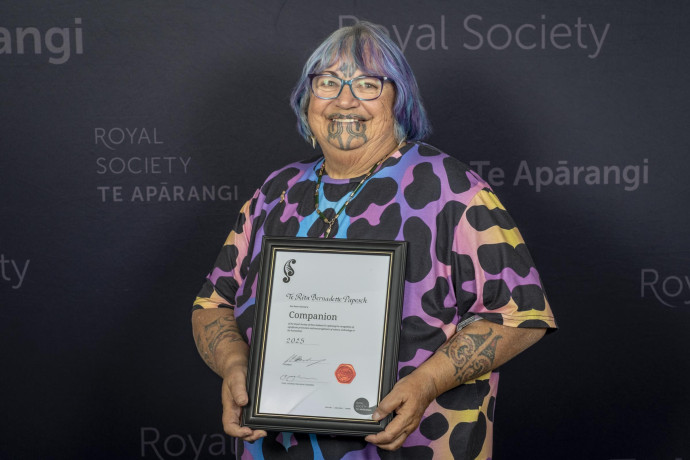News
Published 9 October 2025Revitalising Māori performing arts

Dr Te Rita Papesch CRSNZ (Waikato-Maniapoto, Ngāti Porou, Ngāti Whakaue) has been elected as a Companion of the Royal Society Te Apārangi for her work to revitalise and promote Māori performing arts, language, and cultural identity.
Her academic and artistic leadership has been pivotal in the revitalisation of Māori performing arts, particularly in the areas of composition, performance, and contemporary poetry, and in advancing kapa haka.
As a researcher, she has made a significant contribution to the understanding of the acquisition of te reo Māori in early childhood.
She has published papers and books, and presented widely on the traditional and changing roles of Māori women in the performing arts and in society.
"I can firmly say that I am kapa haka and kapa haka is me." – Te Rita Papesch
Te Rita says she was inspired by her parents, who served their community and were singers and musicians.
“They were my first inspiration, especially in academia.”
“Of ten siblings, six of us were teachers, so how could I not be?”
She says it was her father-in-law who introduced her to group haka performance. She then began to perform for Te Rau Aroha, He Toa Takitini, and the New Zealand Māori Company.
“Sir Tīmoti Karetū was my mentor from there on in. He made me the kaitātaki wahine (female leader) of Te Kapa Haka o Te Whare Wānanga o Waikato.”
“My proudest moment was in 2012, when my children’s own kapa haka, Te Haona Kaha, performed on the Tainui kapa haka regional stage.”
Te Rita says her academic journey prompted her to write articles and books featuring kapa haka.
She says one of the biggest challenges she faced was being a solo mother of seven children (all of whom have since become teachers) while still managing to have a long academic career and being able to travel the world through kapa haka.
“My kapa haka became a pseudo mother and carer of my children to allow me to do what I needed to do and also my university students who would collect my babies from pre-school and look after them until I finished teaching.”
Te Rita says she was fortunate to have brilliant colleagues in the Department of Māori at both the universities she taught at, along with the polytechs and wānanga.
“They were inspirational, especially John Te Rangiāniwaniwa Rangihau, who taught me how to Mau Patu. I must also mention my doctoral supervisor, Dr Sharon Mazer, who remains my friend and encourager today, for making me believe in myself as a writer and researcher.”
When thinking about the future of her career, Te Rita says she is writing a book about kapa haka and a chapter about health and wellbeing through kapa haka, with a focus on takatāpui (people who identify with diverse genders). She hopes more kapa haka researchers will do the same.
“We still have a paucity of written material on kapa haka.”
“It amuses me that whenever an official political or corporate party travels overseas they always want to take a kapa haka group with them to make them visibly ‘from New Zealand’, and yet it has taken eons to be funded on a parity with the symphony orchestra and ballet company whose art forms do not originate in this country. Hopefully this will continue to improve.”
Te Rita says that performance studies is one of the newest areas of academic study worldwide, initiated by Professor Richard Schechner of New York, and kapa haka sits squarely within that discipline.
“I can firmly say that I am kapa haka and kapa haka is me.”
